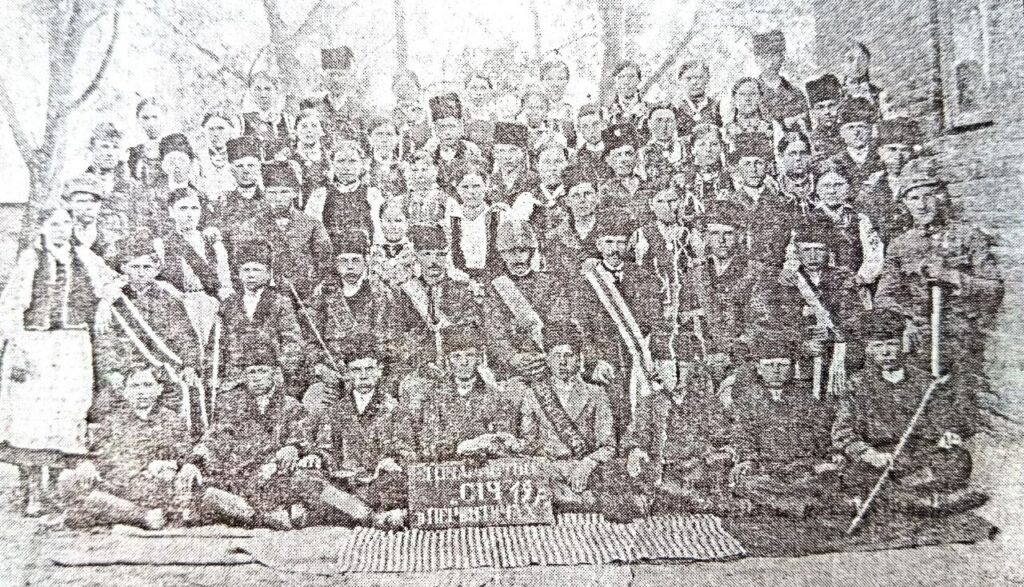We continue a series of stories by riflemen of the Ukrainian Galician Army, residents of the Sokal region, about the events of the Polish-Ukrainian war.
The publication was published by the newspaper Vpered / Voice from across the Bug in 1990.
We bring to your attention the memoirs of a ninety-seven-year-old resident of the village of Perviatych, Fedir Martynovych SEMENIUK.
– I served in the Austrian army from 1915 to 1917. During the First World War, I was taken prisoner by the Russians in Katerynoslav. In 1917, we were liberated by the revolution. We were returning home before the harvest. We got to Ternopil by rail, and there we were attacked by the Austrians, who were still at war at the time, who took us away and said that we were “communist infection.” Two weeks later, we were released because Austria had collapsed…
I walked home. There were posts of Ukrainian riflemen in the villages.
I stayed at home for two Sundays. I saw the guys gathering in the riflemen. I joined them. Forty of my fellow villagers went with me. We were gathered in the Cossack style. We swore to defend Ukraine near Shevchenko’s portrait. We went to Sokal.
The intelligentsia on the balconies greeted us joyfully, and we walked with the song “Ukraine has already risen.” We swore to give our lives for Ukraine. We were sent home for two more days, and then we were quartered in the house where the boarding school is now (in Sokal – ed.).
A centurion, Ivanets, came to us – he was from Sokal. He began to gather riflemen. We received weapons and uniforms. We defended Sokal. Then we were called to Lviv… Then we went to Tudorkovychi, Nismychi, and Uhryniv. We defended these villages: There was no one behind us.
A telegram came to Tudorkovychi saying that the Poles were beating our riflemen and looting Nismychi
It was on the second day of Christmas. The Poles captured the prisoners, put them in a cellar, and threatened to tear out their tongues. We freed them and began to attack the enemy. We drove them to the Uhryniv River, where we drove them. Shurmyak’s hundred arrived early. They were looking for Poles.
Then we returned to Tudorkovychi, and then went to Ivanychi and Volodymyr. In Porytsk we got weapons and uniforms.
The Polish gentry contacted France and Gallier’s army appeared
We had no help. We retreated to Dubno, where the Poles beat us badly. After we were defeated, I got home. However, we had many traitors.
And one woman (her son was taken by the Poles) betrayed me. In Shpykolosy, the Poles captured me. They tortured me a lot. I was in Lviv in a brigade, in a cell with up to forty people. There I contracted typhus. My sister Ksenia came to visit me in the Maria Theresa hospital. I had a very high fever, so they tied me to the bed to prevent me from running away. They thought I had gone crazy. But this state was due to the high temperature.
So I ended up back in the brigade, and from there I was transferred to the chancellor’s camp in Pikulych. There were three thousand of our guys there. What a horror the captured Ukrainians had to endure there. Hunger, typhoid, cold. We were fed with horse hooves, bitter coffee made from chestnuts, and we were searching for frozen beets and potatoes in the gardens like cattle. Every night 7-8 people died under such conditions.
A committee for the defense of Ukrainians was established in Przemyśl.
My brother came to me and gave me some money. I bribed a Polish doctor with it. In addition, a Ukrainian doctor who was a member of the committee helped me get out of captivity.
And in the village, the bells were already ringing for me
Everyone at home was very happy. They said that the poster boy Belon had asked for me. I went to get my teeth cleaned for four more months.
Then my parents said: “Get a job, because you’re only in wars and prisons, get married.”
But when we went to the war, our mothers blessed us, saying, “Go, God help you.”
Many of my brothers died for the freedom of Ukraine. Sotnyk Ivanets, who lived in Sokal somewhere behind the church, was killed near Nismych. Petty Officer Semeniuk and his resident soldier Tsvikula also fell in battle.
Many years have passed since then. But I cannot forget these events.
Although I heard a lot of insults, a lot of neglect… But I believed in better times. And they came.
Now my grandchildren (and their eight and nine great-grandchildren) sing “Chervona Kalyna”. And the blue and yellow flag flies in the village. And the graves of the UGA riflemen are growing out of the ground as a reproach to those who desecrated them. Now you can die with a peaceful heart.
But good people don’t let me die, and they often ask me about those times, experiences, and events. I have to tell them everything…

